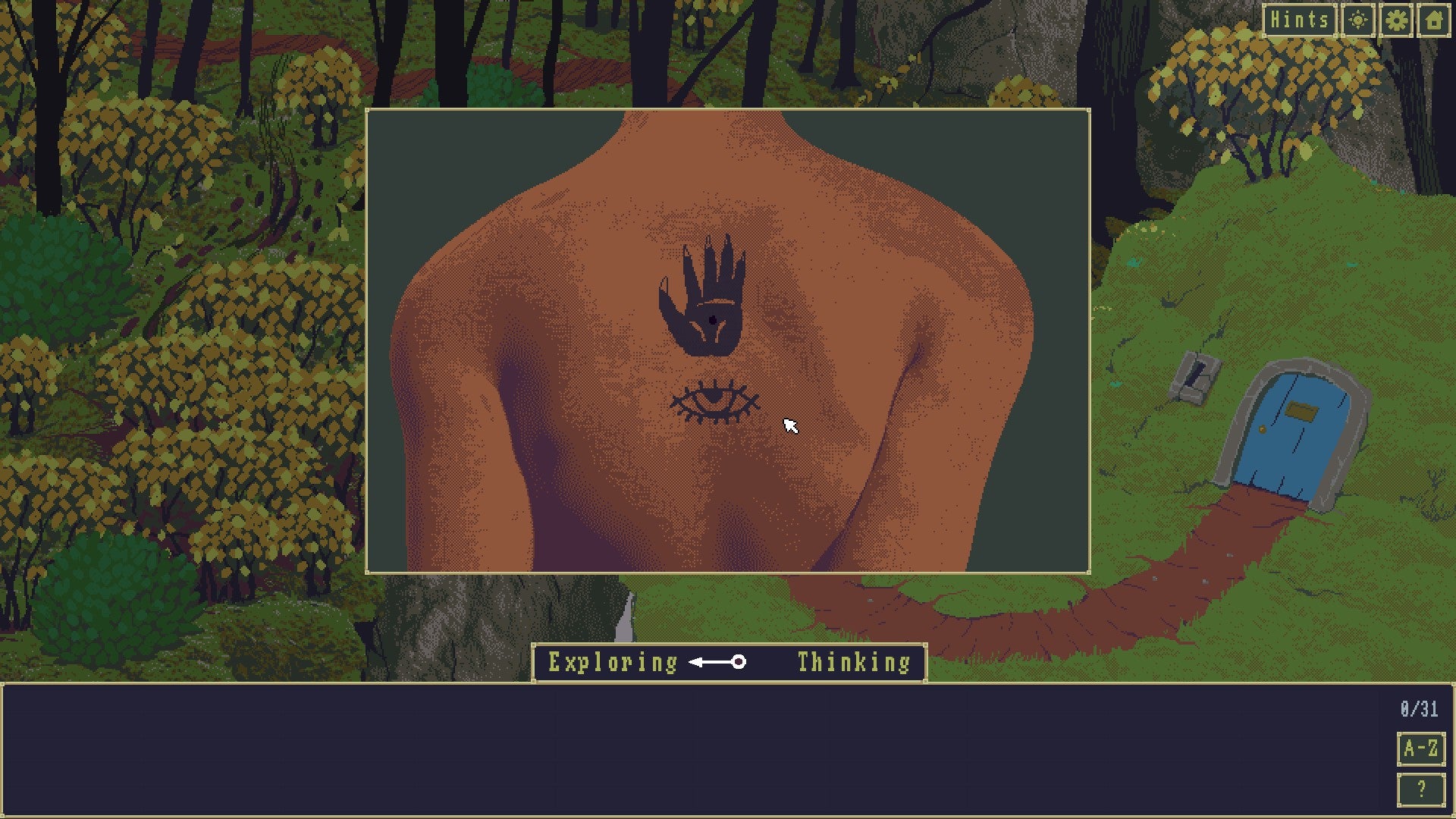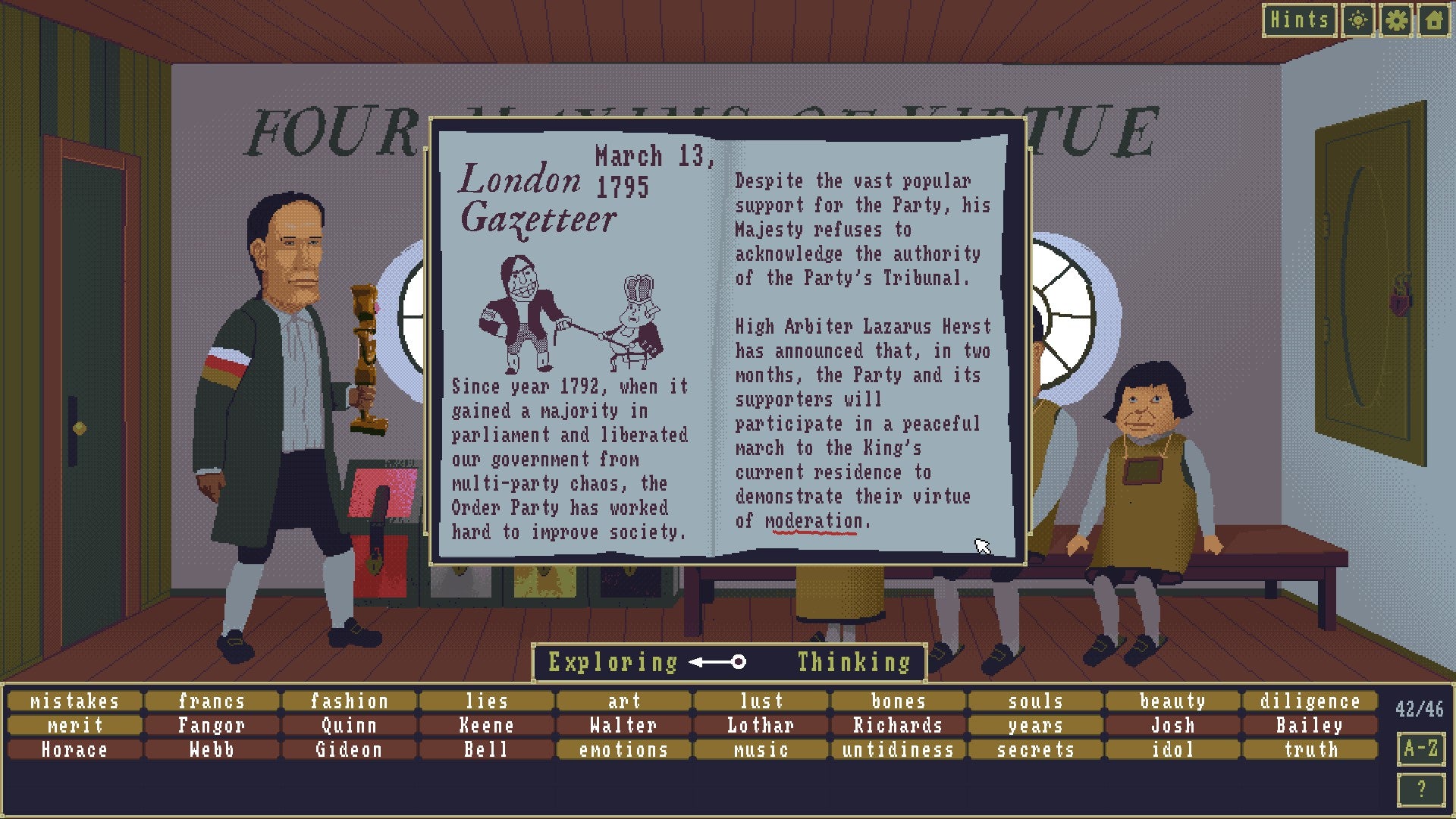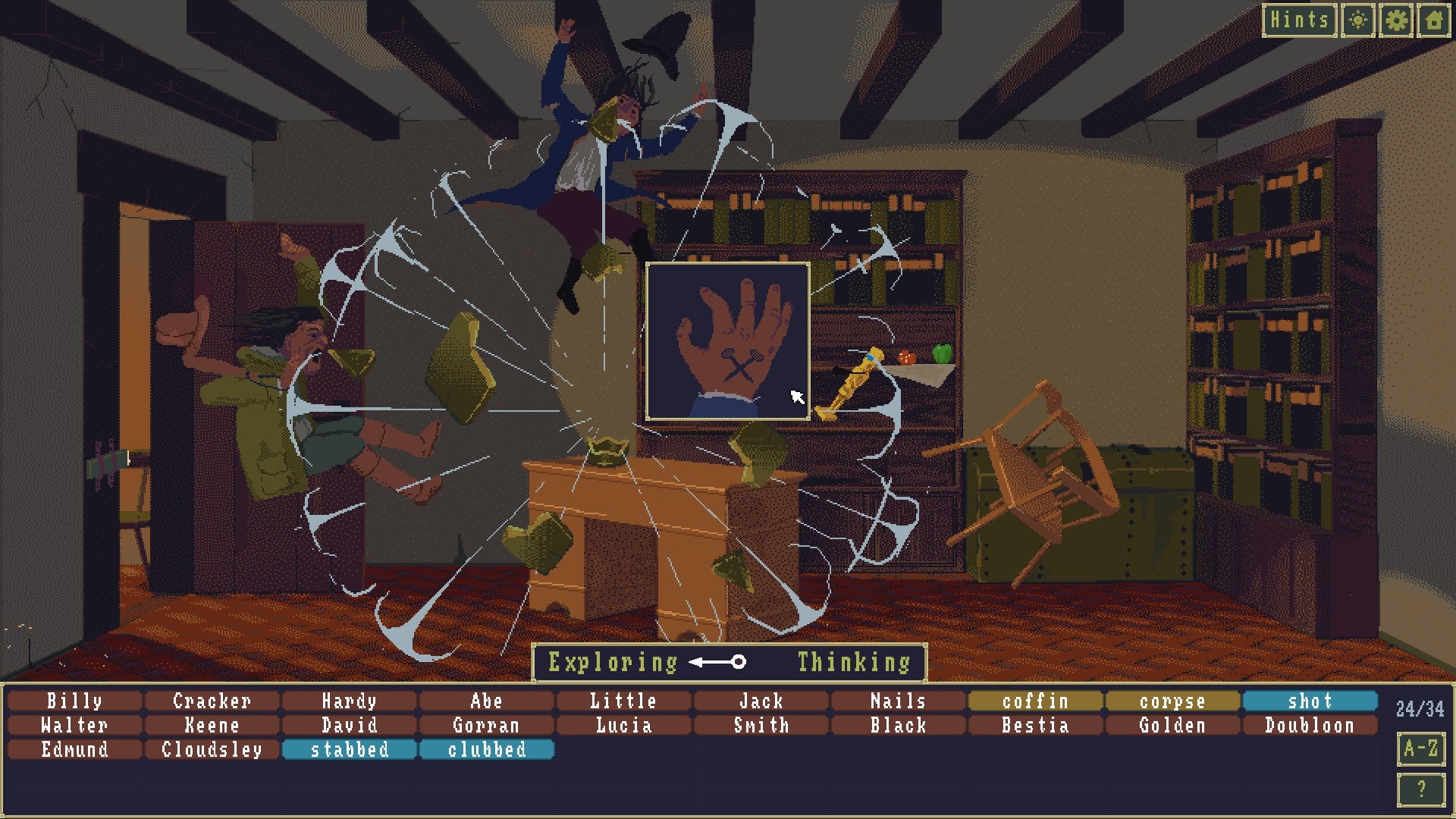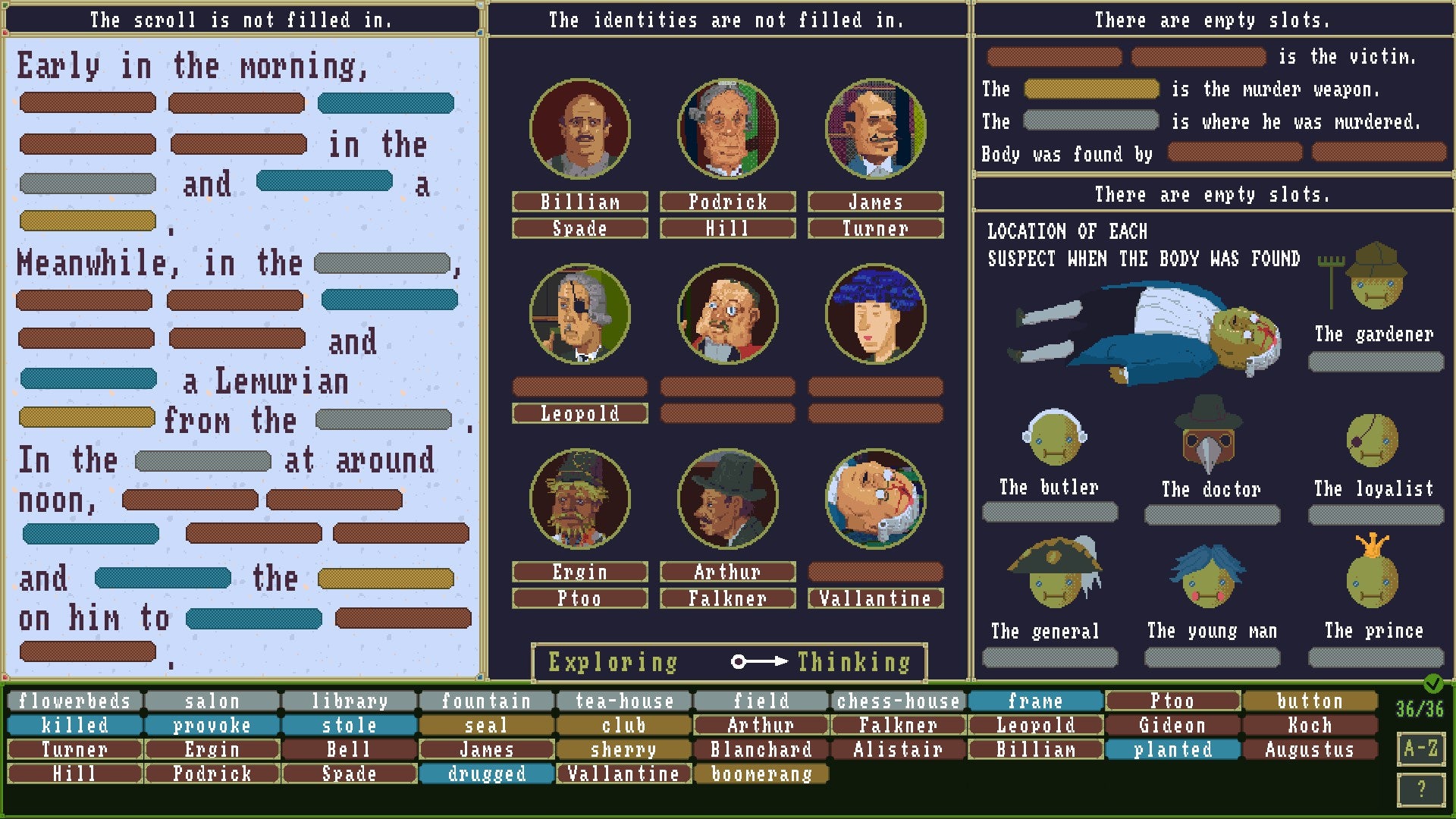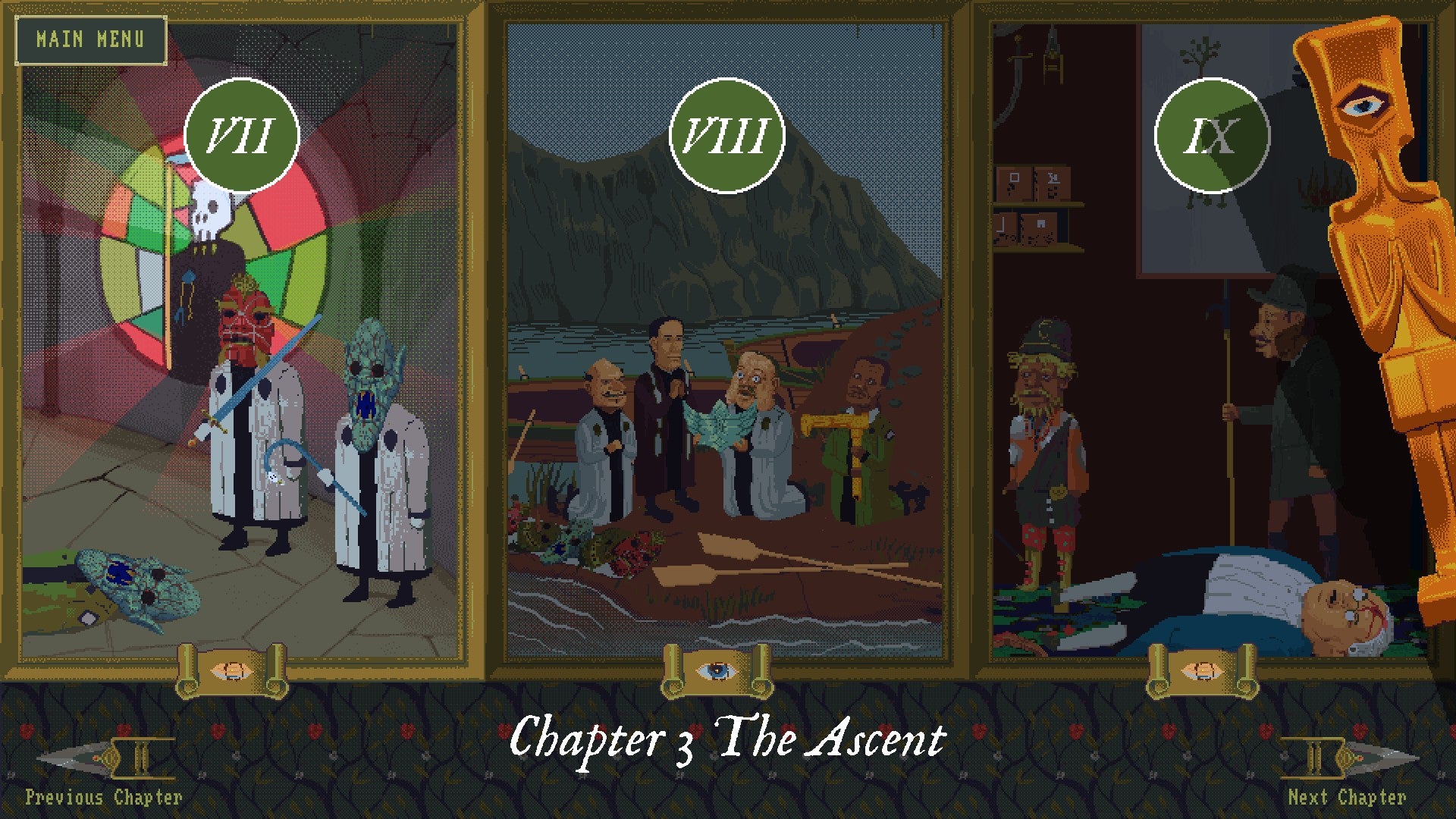Golden Idol plays on basic intuition and common sense, and while it takes me a few moments to warm up to the game, I soon develop genuine admiration for its simplicity. As I examine this first scenario - a perfectly frozen moment in time with potent little touches of animation - a few exploratory clicks are enough to get going. There’s a man being pushed off a cliff, and a sprinkle of hotspots around the screen inviting me to delve deeper. I can switch between two modes, Exploring and Thinking, which are both fairly straightforward to pick up. In Exploring mode, I scour the current scenario and find clues to explain what’s happening - who is the pusher, and who is being pushed? What kind of objects is the pusher carrying that might suggest his identity? I harvest key names, locations, and verbs, which fill the lower section of my screen like a bizarre set of fridge magnet words. These key terms come into play in Thinking mode, where I must fill in the blanks on a story scroll to explain the scenario and identify the people present. Once I get into the Exploring/Thinking groove - around the second or third scenario, things really start to heat up - it gets a little easier to discern the shape of the bigger picture. In each scenario, I solve one murder at a time against a backdrop of generational greed, backstabbing, and secret plots. There are strange cults, accidental poisonings, and simmering glints of a working-class uprising. There are several generations of Cloudsleys, and a robust ensemble cast of supporting characters that I quickly learn to identify by face alone, which becomes extremely helpful in later chapters. Everything revolves around the titular golden idol - an enigmatic device that can be used to manipulate matter - which comes from a foreign tribe whose weary representatives have been forced to do a colonial song-and-dance for their oppressors. As with all point-and-click types, there’s a neat sliver of humor running through the writing - droll one-liners and comical set-ups that maintain a smart sense of levity throughout the game. Even working with largely static character art, the devs manage to imbue the scenarios with a bristling sense of tension - there are people getting killed, and everyone is right to be on edge. There are numerous red herrings and seemingly innocuous turns-of-phrase designed to throw you off track - in one scenario, a maid’s oddly deliberate comment about the satisfaction of her master’s guests piques my already-burgeoning suspicion. Everyone is a suspect, especially where money and power are involved. There are times when I hit a cognitive wall with Golden Idol and had to put it down to reset both my brain and enthusiasm for its ambition. The puzzles get more complicated, with later chapters containing multiple scenarios where you have to flick between different rooms and locations; the Thinking mode for these tougher portions can initially feel a little daunting, with multiple sections that must be filled in like a neurotic madlibs pamphlet - not entirely dissimilar to the anxiety one might feel staring at a blank page on a deadline. I scrawl handwritten notes, which are useful to an extent - I end up taking pictures of the screen with my phone for ease of reference for the “late-game” scenarios where some basic math is required. Still, even when Golden Idol overwhelms, I find myself reveling in its eye to detail, and the Hogarthian flavor of its political and social commentary on London. There are cheeky digs at the upper-class disconnect with the common man, like the former’s total inability to understand the widespread problem of illiteracy. Everyone loves to make fun of bureaucratic procedures and banal forms of record-keeping. And there are, of course, cartoons and caricatures aplenty - the cornerstones of satire that transcend class divisions to make us all fools. One great example of the game’s satirical edge is the portrayal of Rose - clearly swimming in both material and cultural bounty from England’s imperial excursions abroad. When you click on her “inventory” to see what kind of objects she holds, it’s a telling assortment of exotic foreign paraphernalia; she also has an affected use of Hindi words that clearly made their way to her circles through colonial adoption. She’s also got a book by Shamal Bhatt - a (real) medieval Gujarati poet whose work might have inspired some of the fictional aphorisms that pop up in the game. Golden Idol follows a linear trajectory that raises the stakes as time passes over each chapter - the Cloudsley family’s petty inheritance squabbles are dwarfed by much bigger nationwide changes, like the ascension of a totalitarian party to political office. Even as years go by, there’s a vibrant, thrumming sense of momentum as years pass, thanks to the minimal but incredibly effective score that communicates a terrific sense of urgency without making me feel rushed. There’s even a bit of a Victorian parlor game vibe where I can imagine people at the time - the middle-class everyman of this fictional London - playing speculative social games about who might’ve assassinated these public figures. There are either correct answers or wrong answers - no grey area for speculation - which can occasionally spur moments of frustration when I’ve been staring at the screen for too long. It’s only natural - this is an experience that calls for care and concentration to get things right. There’s a fairly vague hint system, albeit with a built-in “work for your help” mechanic that involves matching known faces and objects with the right names. The game’s finale feels like a collision of moving parts where all the key players finally come together - it’s only until the Epilogue chapter that we get the final reveal (which savvier players might piece together before I did). Perhaps if I hadn’t been swept up in the immersive quality of Golden Idol’s world and its petty, scheming inhabitants, I would have kept a beadier eye on the bigger picture, which of course isn’t the point - I’m content to follow the breadcrumbs and let the story lead me where it needs to go. It’s ultimately a familiar, circuitous tale of how absolute power corrupts, buried at the core of a smart, beautifully-crafted, gorgeous project that draws from a rich historical well of satire and cartoon art that I’d love to see in more games. For me, Golden Idol’s biggest triumph is the understated writing - this is a story with full-throated confidence in the player’s deductive abilities, which elevates this from a basic murder-mystery game to a singular piece of narrative art.


